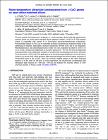| dc.contributor.author | Bradley, Louise | |
| dc.contributor.author | O'Reilly, Lisa | |
| dc.contributor.author | Lucas, Olabanji | |
| dc.contributor.author | McNally, Patrick | |
| dc.contributor.author | Reader, Alec | |
| dc.contributor.author | Natarajan, Gomathi | |
| dc.contributor.author | Daniels, Stephen | |
| dc.contributor.author | Cameron, David C. | |
| dc.contributor.author | Mitra, Anirban | |
| dc.contributor.author | Martinez-Rosas, Miguel | |
| dc.date.accessioned | 2019-11-04T17:10:29Z | |
| dc.date.available | 2019-11-04T17:10:29Z | |
| dc.date.issued | 2005 | |
| dc.date.submitted | 2005 | en |
| dc.identifier.citation | O'Reilly, L., Lucas, O.F., McNally, P.J., Reader, A., Gomathi Natarajan, Daniels, S., Cameron, D.C., Mitra, A., Martinez-Rosas, M. & Bradley, A.L. Room-temperature ultraviolet luminescence from g-CuCl on silicon, Journal of Applied Physics, 98, 11, 2005, 113512 | en |
| dc.identifier.other | Y | |
| dc.identifier.uri | https://aip.scitation.org/doi/10.1063/1.2138799 | |
| dc.identifier.uri | http://hdl.handle.net/2262/90003 | |
| dc.description | PUBLISHED | en |
| dc.description.abstract | We have probed the luminescence properties of a wide-band-gap, direct band-gap optoelectronic material, grown on closely lattice-matched silicon substrates, namely, γ-CuCl on Si. This material system is compatible with current Si or GaAs-based electronic/optoelectronic technologies. Polycrystalline epitaxy of CuCl can be controlled such that it maintains an orientation similar to the underlying Si substrate. Importantly, chemical interactions between CuCl and Si are eliminated. Photoluminescence and cathodoluminescence results for CuCl, deposited on either Si (100) or Si (111), reveal a strong room-temperature Z3 excitonic emission at ∼387nm. We have developed and demonstrated the room-temperature operation of an ultraviolet electroluminescent device fabricated by the growth of γ-CuCl on Si. The application of an electrical potential difference across the device results in an electric field, which promotes light emission through hot-electron impact excitation of electron-hole pairs in the γ-CuCl. Since the excitonic binding energy in this direct band-gap material is of the order of 190meV at room temperature, the electron-hole recombination and subsequent light emission at ∼380 and ∼387nm are mediated by excitonic effects. | en |
| dc.format.extent | 113512 | en |
| dc.language.iso | en | en |
| dc.relation.ispartofseries | Journal of Applied Physics; | |
| dc.relation.ispartofseries | 98; | |
| dc.relation.ispartofseries | 11; | |
| dc.rights | Y | en |
| dc.subject | Epitaxy | en |
| dc.subject | Polycrystalline material | en |
| dc.subject | Electron impact ionization | en |
| dc.subject | Transition metals | en |
| dc.subject | Excitonic effects | en |
| dc.subject | Photoluminescence | en |
| dc.subject | Thin films | en |
| dc.subject | Chemical elements | en |
| dc.subject | Luminescence | en |
| dc.subject | Charge recombination | en |
| dc.title | Room-temperature ultraviolet luminescence from g-CuCl on silicon | en |
| dc.type | Journal Article | en |
| dc.type.supercollection | scholarly_publications | en |
| dc.type.supercollection | refereed_publications | en |
| dc.identifier.peoplefinderurl | http://people.tcd.ie/bradlel | |
| dc.identifier.rssinternalid | 34298 | |
| dc.identifier.doi | http://dx.doi.org/10.1063/1.2138799 | |
| dc.rights.ecaccessrights | openAccess | |
| dc.identifier.rssuri | http://scitation.aip.org/getpdf/servlet/GetPDFServlet?filetype=pdf&id=JAPIAU000098000011113512000001&idtype=cvips&prog=normal | |
| dc.identifier.orcid_id | 0000-0002-9399-8628 | |




